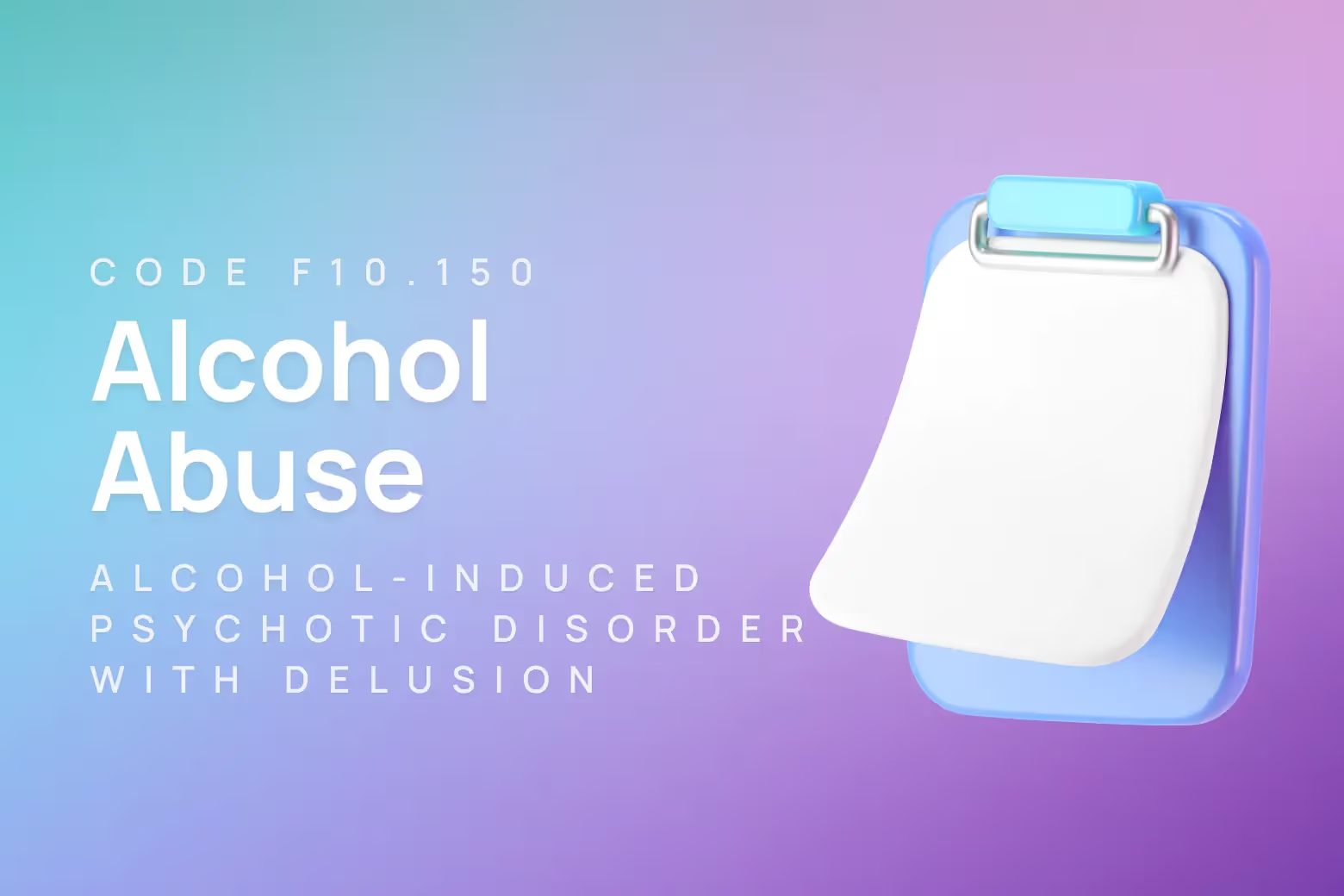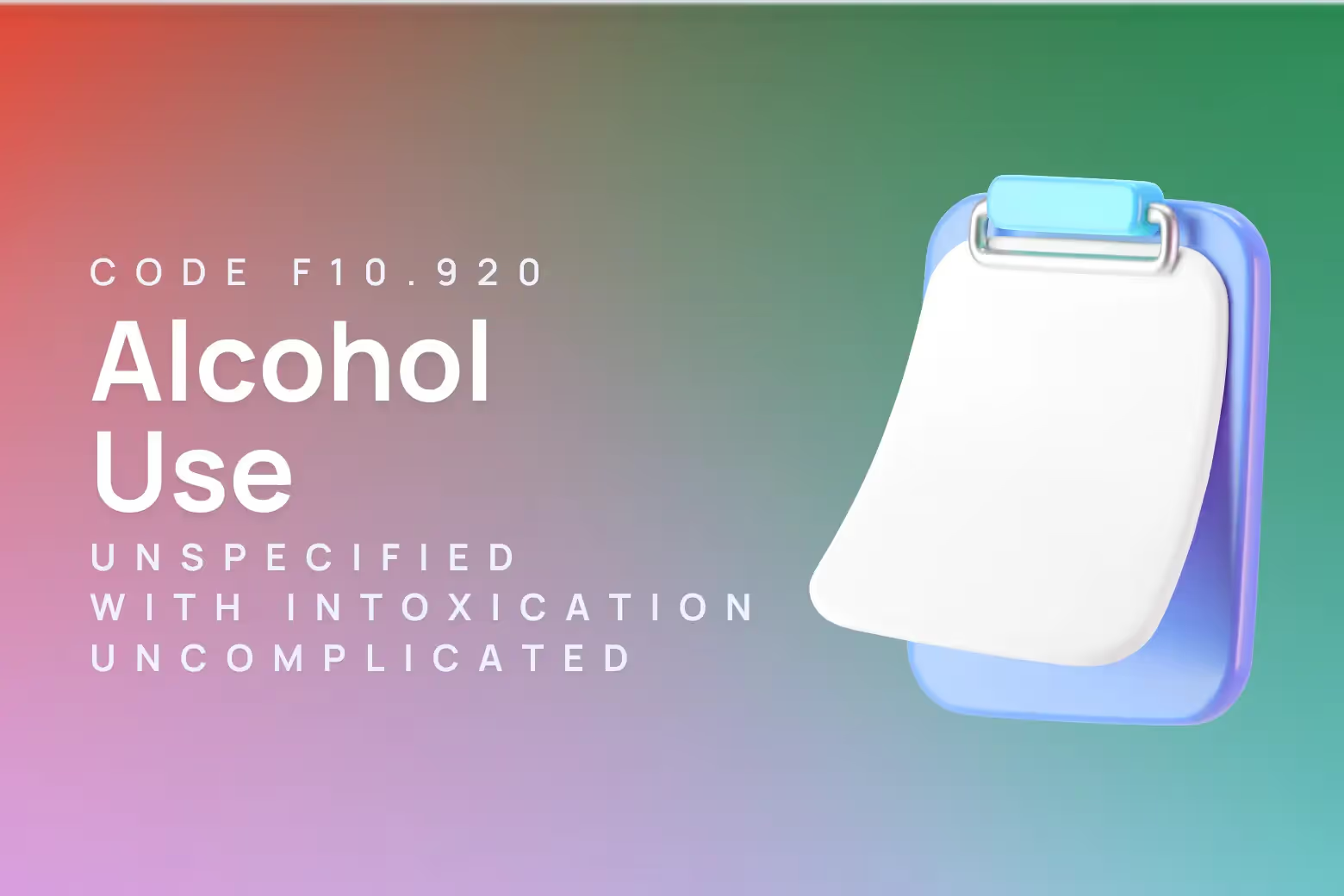ICD-10 code for alcohol abuse with intoxication, uncomplicated

F10.120 is the ICD-10 code for alcohol abuse with intoxication, uncomplicated.
This code applies when a client presents with both problematic alcohol use patterns and current signs of alcohol intoxication without additional complications.
Accurate diagnosis and coding help ensure proper treatment planning and reimbursement.
Key features:
- Combines alcohol abuse pattern with current uncomplicated intoxication
- Requires presence of both abuse criteria and intoxication symptoms
- Distinguished from more severe alcohol dependence codes
- Essential for billing and treatment documentation in behavioral healthcare

Diagnostic criteria for alcohol abuse with intoxication (F10.120)
This diagnosis requires meeting criteria for both alcohol abuse and alcohol intoxication simultaneously.
The "uncomplicated" designation means no additional serious medical complications are present during the intoxication episode.
Alcohol abuse involves recurrent problematic drinking that causes significant life problems. Key patterns include:
- repeated failure to meet work or home responsibilities due to drinking
- using alcohol in dangerous situations like driving
- encountering legal troubles from alcohol use
- continuing to drink despite social or relationship conflicts caused by alcohol
For the intoxication component, clients must show clear signs of recent alcohol consumption affecting their mental state and behavior. Physical examination may reveal:
- alcohol odor on breath
- facial flushing
- bloodshot eyes
- poor coordination
- slurred speech
Mental status changes include impaired judgment, mood alterations, and reduced inhibition.
When to use F10.120 diagnosis code
Proper differential diagnosis is essential when working with alcohol-related presentations. Several related codes have distinct applications based on severity and complications present.
F10.120 vs F10.220 (Alcohol dependence with intoxication, uncomplicated)
The primary distinction lies in the underlying pattern of alcohol use.
F10.120 applies when the client shows problematic drinking patterns without the neuroadaptive changes seen in dependence. Clients typically don't exhibit tolerance requiring increased amounts for effect, nor do they experience characteristic withdrawal symptoms when stopping.
F10.220 is appropriate when clients demonstrate true physiological dependence including tolerance, withdrawal symptoms, or using alcohol to prevent withdrawal.
Dependence also involves stronger compulsive use patterns and more time spent obtaining or recovering from alcohol use.
F10.120 vs F10.121 (Alcohol abuse with intoxication delirium)
F10.121 should be used when intoxication includes delirium with altered consciousness, confusion, or cognitive disturbances. These clients show significant disorientation, memory problems, or perceptual disturbances beyond simple intoxication effects.
F10.120 is the correct choice when intoxication symptoms are limited to typical effects like impaired coordination, mood changes, and reduced inhibition without delirium or severe cognitive impairment.
Related ICD-10 codes
- F10.12 - Alcohol abuse with intoxication (parent category)
- F10.121 - Alcohol abuse with intoxication delirium
- F10.129 - Alcohol abuse with intoxication, unspecified
- F10.10 - Alcohol abuse, uncomplicated
- F10.220 - Alcohol dependence with intoxication, uncomplicated
- F10.230 - Alcohol dependence with withdrawal, uncomplicated
Interventions and CPT codes for alcohol abuse with intoxication
Evidence-based treatment approaches address both the acute intoxication and underlying abuse patterns through structured interventions and ongoing support.
Initial assessment and diagnostic evaluation
Comprehensive psychiatric diagnostic evaluation establishes the diagnosis and creates treatment plans. This includes detailed alcohol use history, mental status examination, and risk assessment. CPT 90791 covers this initial evaluation for first visits or new treatment episodes.
Individual psychotherapy interventions
Motivational interviewing serves as a first-line approach for addressing ambivalence about drinking reduction. This collaborative style helps clients explore their own reasons for change without confrontation. Sessions typically focus on developing discrepancy between current drinking and client values.
Cognitive behavioral therapy represents another evidence-based intervention for alcohol abuse. CBT sessions teach coping skills, identify high-risk situations, and modify dysfunctional thoughts about alcohol. Techniques include relapse prevention strategies, stress management, and drinking refusal skills training.
Individual therapy sessions are billed using CPT 90832 for 30-minute sessions, 90834 for 45-minute sessions, or 90837 for 60-minute sessions based on actual time spent.
Screening and brief intervention services
Many clients benefit from structured screening followed by brief counseling interventions. These services help identify problem drinking levels and provide immediate feedback and motivation for change.
For commercial insurance, CPT 99408 covers structured screening and brief intervention for 15-30 minutes, while 99409 covers sessions longer than 30 minutes. Medicare patients may be billed using G0396 and G0397 for similar services.
Brief intervention often incorporates FRAMES elements:
- Feedback about drinking consequences
- Responsibility for change
- Advice to reduce drinking
- Menu of options
- Empathy
- Self-efficacy support
Group therapy approaches
Group interventions provide peer support and skills training in a cost-effective format. CPT 90853 covers group psychotherapy sessions focusing on relapse prevention, coping skills, and mutual support among participants with similar struggles.
Family therapy interventions
Family members often play crucial roles in recovery and may need support dealing with alcohol-related problems. CPT 90846 covers family therapy sessions without the client present, while 90847 includes the client in family sessions.
How Upheal improves F10.120 ICD-10 documentation
Behavioral healthcare providers face increasing documentation demands while trying to focus on client care. Clinical documentation platforms can help bridge this gap through automated support and improved accuracy.
Suggesting appropriate ICD-10 codes based on session content
During therapy sessions, providers gather information about drinking patterns, intoxication episodes, and functional impairments.
Upheal's clinical documentation platform analyzes session notes and conversations to suggest relevant ICD-10 codes including F10.120 when appropriate.
The platform recognizes key indicators like reports of drinking before driving, work performance problems related to alcohol, or descriptions of current intoxication symptoms. This helps ensure accurate coding that reflects the full clinical picture without requiring manual code lookup.
Maintaining HIPAA-compliant records with proper diagnostic coding
Accurate diagnostic documentation serves multiple purposes beyond billing.
Proper ICD-10 coding creates clear treatment records that support continuity of care when clients transition between providers or levels of care.
Upheal helps maintain comprehensive documentation that includes diagnostic justification, treatment planning rationale, and progress notes.
All records maintain strict HIPAA complianc while ensuring codes like F10.120 are properly supported by clinical observations and client reports.
Reducing administrative burden so you can focus on client care
Manual documentation tasks can consume significant time that could be spent on direct client care.
Clinical documentation platforms help automate routine tasks while maintaining accuracy and compliance requirements.
Rather than spending time researching correct ICD-10 codes or formatting notes, clinicians can focus on therapeutic interventions and client engagement.
The platform handles documentation structure while preserving the clinical insights that drive effective treatment.
Supporting clients with alcohol abuse and intoxication
Clients presenting with F10.120 diagnoses often feel ambivalent about changing their drinking patterns.
Many recognize problems but struggle with the perceived benefits alcohol provides for stress relief or social confidence.
Effective treatment begins with building therapeutic rapport and exploring the client's own concerns about their drinking.
Rather than confronting resistance, successful approaches invite clients to examine discrepancies between their drinking and personal values or goals.
Treatment planning should address both immediate safety concerns related to intoxication episodes and longer-term abuse patterns.
This might include safety planning for high-risk situations, developing alternative coping strategies, and building support systems that don't revolve around alcohol use.
For clinicians seeking to improve their alcohol-related diagnostic documentation and treatment planning, Upheal's clinical documentation platform provides intelligent support for ICD-10 coding and comprehensive record-keeping.
The platform helps ensure accurate diagnosis while reducing administrative time, allowing you to focus on what matters most — helping clients achieve lasting recovery.
Learn more about Upheal and how it can support your clinical practice.













